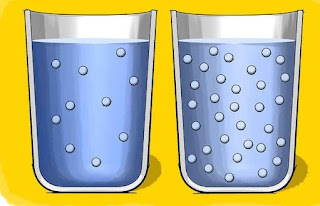What Is a Solute, Types of Solute & Solute Properties
A solute is defined as the dissolved substance in a solution. The solvent is present in greater quantities than the solution for fluid solutions.
Thus, concentration is a measurement of the quantity of a solvent present in a chemical solution.
Definition of Solute?
A solute is a substance that is dissolved in a solution or in a mixture. Sometimes, a solute is called a substance. While preparing a solution or any type of mixture, there are three components involved: the solute, the solvent and the resulting solution. A solute is dissolved in a solvent, and one or more solvents or solutes form a solution.
Types of Solute
Homogeneous means that the components of the mixture form a single phase. Heterogeneous means that the components of the mixture are of different phase.
The properties of the mixture including concentration, temperature, and density can be uniformly distributed through the volume but only in the absence of diffusion phenomena or after their completion. The major types of solute are:
Gaseous
Liquid
Solid
1. Gaseous:
If a solvent is a gas, then only gases are dissolved under a given set of conditions. An example of a gaseous solution is air such as oxygen and other gases dissolved in nitrogen.
2. Liquid:
If the solvent is a liquid, then almost, liquids, and solids can be dissolved. Here are some examples:
Gas in liquid
Oxygen in water
Carbon dioxide in water
Liquid in liquid
The mixing of two or more substances of the same chemistry but different concentrations to form a constant.
Alcoholic beverages are basically solutions of ethanol in water.
Solid in liquid:
Sucrose (sugar) in water
Sodium chloride (NaCl) (salt) in water.
3. Solid:
If the solvent is solid, then gases, liquids and solids can be dissolved.
Gas in solids
Hydrogen dissolves rather well in metals, especially in palladium;
Liquid in solid
Mercury in gold, forming an amalgam
Water in solid salt or sugar, forming moist solids
Hexane in paraffin wax
Solid in solid
Steel, basically a solution of carbon atoms in a crystalline matrix of iron atoms.
Alloys like bronze and many others.
Polymers containing plasticizers.
Solute Properties
A solute displays characteristic properties in a solution:
The distribution of a dissolve solute is homogeneous. That is, the number of solute particles per volume is the same, no matter where a solution is sampled.
Solute particles are not visible to the eye.
The solute in a solution does not scatter light.
Solute particles do not settle out of solution and cannot be separated from a solution by filtration.
In a solution, the solute is in the same phase as the solvent.
Examples of Solutes
Salt in Food.
Oxygen in Seawater.
Sugar in Tea.
Quinine in Tonic Water.
Carbon Dioxide in Carbonated Drinks.
Ethylene Glycol in an Antifreeze.
Ethanol in Cocktails
Frequently Asked Questions
Is sugar a solute?
In this example, sugar is a solute. That's what chemists call a substance that dissolves into another. The water is a solvent—the liquid that breaks down a solute.
Do all waters dissolve solutes?
Solutes dissolved in water (solvent) are called aqueous solutions. Not all substances are soluble in water. ... It has to do with the structure of the water molecule. Oxygen has a greater attraction for electrons, so the shared electrons (bonding electrons) spend more time close to oxygen then to either of the hydrogens.
Do solutes dissolve faster in hot water?
Sugar dissolves faster in hot water than it does in cold water because hot water has more energy than cold water. When water is heated, the molecules gain energy and, thus, move faster. As they move faster, they come into contact with the sugar more often, causing it to dissolve faster.

Comments
Post a Comment